Have you ever had that feeling that you’ve arrived in a place where you couldn’t feel more out-of-place if you tried?
Yesterday I went to interview Charles Young, founder of the London Anti-Crime Education Scheme (LACES). An ex-prisoner himself; he has spent the last 18 years travelling around the country teaching young people about the slippery slope. And yesterday was my chance to hear a firsthand account of prison life.
The venue: Tower Hamlets, East London.
Having never driven properly through London I arrived slightly flustered and uncomfortable as I had spent the last 2 hours driving round aimlessly following a sat nav that seemingly repeated to “[calculate]” my route as I kept missing turnings! As I parked in a bay alongside the venue, I went to get change in a local shop for parking. Walking there I could not have felt more uncomfortable. I was already feeling slightly uncertain, but walking past a large group of teenagers hovering outside the newsagent: one of the boys shouting “Alright darlin’” to me certainly did not make me feel at ease. I kept my head down and focused on parking and preparing myself for the next two hours.
The venue had moved to a larger hall, a church in the middle of an estate. I was introduced to Charlie, who I immediately warmed to. A bit of a jack the lad character: he was chatty; charismatic; but at the same time determined to put the point across to youngsters not to go down the same route as he had done.
With the mock prison cell set up (Charlie has been given an old bed from a real prison, draws, tables, a toilet and bucket, and a sink, in order to create a prison cell to engage the audience.), we awaited the arrival of the local kids.
As they entered, it was clear they had a bit of attitude. The stereotypical estate characters that appeared to think they knew more than everyone else. I was told afterwards that some of them had in fact had run-ins with the police already, despite being only 15-17 years old. But the fact that they turned up was promising. And Charlie had them engaged for entire 2 hours: 45 minutes longer, I was told, than any other talk that they would have been given by the local authorities.
“This could be your future…”
Although Charlie had his own stories from prison, he had also brought in 3 volunteers to help put the point across.
One really stood out for me. For the purposes of this blog I will call him “X”, as I don’t know if I should say his real name. He had started abusing drugs before resorting to street robbery which had lasted for 10 years, in and out of jail with sentences lasting between 2 months and a year. He had been addicted to crack cocaine and due to his drug abuse is now in hospital after being in a low secure unit, having guidance from 2 occupational therapists. The drugs had affected his concentration and he had to read from a script about his experiences in order for him to stay on track of his thoughts. In contrast to Charlie, who told us that he used to steal credit cards, cars and money for a better life, “X” was willing to use knives to rob people on the street for money. In prison “X” also said that he would not have ruled out violence, whereas Charlie said all he wanted to do was chat to pass the time.
Prison Life
Charlie went on to tell us about prison life. He told us about how he used to pass the time: 23 hours in a cell per day. They would make jokes by placing excrement on paper towels and throwing them on other inmates during yard time hoping they would have diarrhoea that day in order for it to “splat” better.
Holding up a plastic cup, Charlie asked the audience how this was the most effective weapon in prison. Some said heating it up, others said to cut other inmates. The real answer: boiling water and sugar; the boiling water to scald and the sugar to stick to the skin…
And it was the simplest tasks that were the most difficult. Sharing a cell, Charlie explained that you never had any privacy. Going to the toilet would echo around the cell, prison officers would bang on the door to humiliate inmates when they were using the toilet. And for a man’s typical way to relieve tension again, no women, and no privacy.
And it wasn’t just the prison surroundings that were hard to handle. Some cell mates would be abusive. They would call the cell “my cell”, even though it was meant to be shared, and wouldn’t take any “shit” from anyone. Some would even go to the toilet in the other cell mates bed to make a point.
SHUT UP!
I believe the reason why Charlie engages the audience so much is because he involves them in his presentation. From the very beginning he challenged the most cocky ones to an arm wrestle to see how “hard” they were. Joking with them but also telling them who was boss by making them turn their phones off in order to listen to what he had to say. One boy was caught playing on his phone during the talk and Charlie made him stand up and asked him to sit in the cell. Standing at the front, looking like a naughty child, the boy refused to sit in the cell for the rest of the session. And this was a fake prison cell!? I was told afterwards by the sister who was in charge of the church venue that these boys look up to the older people on the estate who break the law, and, as I said earlier, some themselves have already been arrested in the past. But in this case, the boy wasn’t happy with being caught out and made a display of. Which makes me question why commit crime in the first place?
There are other things in the world that don’t involve breaking the law which are fun and don’t run the risk of being locked up and ruining the rest of your life by having a criminal record.
Prevention
As we left the group of teenagers who had been in the audience were outside the church in the estate next door shouting and swearing at each other, and I wondered whether anything that Charlie had just said had got through to them.
Speaking to some of the girls in the audience, though they really enjoyed Charlie’s talk and said it was better “coming from the horse’s mouth as such” because you can see how it affected him, and how the other volunteers regretted their actions and were trying their hardest to get through to these boys.
Earlier, I mentioned Charlie’s volunteers. One was a boy who had been put forward by his mum who believed his behaviour required some assistance in order to direct him away from turning to crime or ending up in the wrong crowd (she admitted when seeing the rest of the audience that she may not have noticed that in the grand scheme of things her son was not actually as much of a nightmare as he could have been!)
To this boy, the presentation couldn’t have been better. Finally out of his prison attire from the talk, he told me how he did not want to end up being bored in a prison cell for 23 hours and wanted to do something with his life.
Inspiration
It was an inspiration to see that Charlie has turned his life around to help people. Some of the feedback afterwards by audience members and participants showed hope that schemes such as LACES can help deter crime.
But is it not about more than that? Charlie said that he is struggling to get funding for the talks. What happens if, one day, he has to stop? Who will be there to help deter crime? Who will be there to explain, from their own experiences, how undesirable prison is?
And I wonder what will happen to the boys from the estate. Will they have listened and taken in the warnings from the speakers, and will they stay on the right side of the law in the future? Either way, the fact that they turned up to the talk is always promising and it was clear from them that they did not enjoy the idea of not being able to do anything all day everything if they were sent to jail. Despite appearances I overheard some of them speak to each other about wanting to become an occupational therapist like those who were there with one of the volunteers, while others, when asked by Charlie why they wanted a job, answered to do something with their lives. I don’t think any one wants to go to prison; they just need that extra guidance to make sure that they really don’t.
Charlie’s talks are increasingly popular and a great way of preventing crime. It’s going to take a long time, and the help of many organisations, to noticeably reduce crime figures.
Sometimes life runs in a vicious circle. It takes a lot for someone who has been brought up in a crime ridden neighbourhood; run by the local gang, to escape the inevitable generational downfall, and I don’t think there will ever be a time when we can completely eradicate crime. But in the mean time, with the help of those dedicating their time to put the word out that prison in not a glamorous place and is not a good life choice, then maybe we can relieve the pain for those who are victims of crime and allow youngsters to do something with their lives and make the most of the options they have, education or otherwise, while they have the chance.


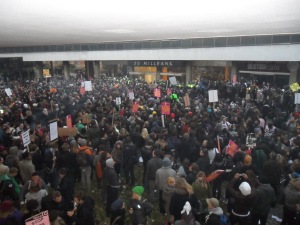
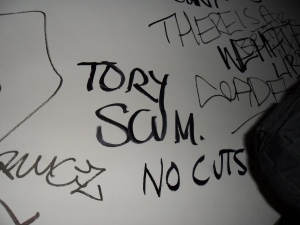
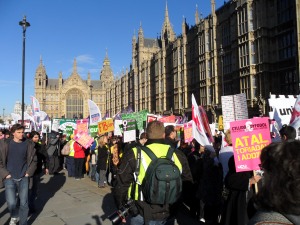
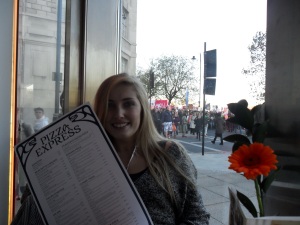


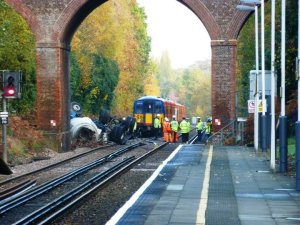
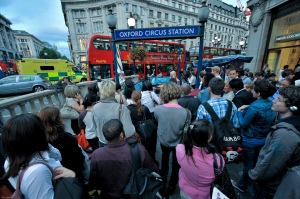
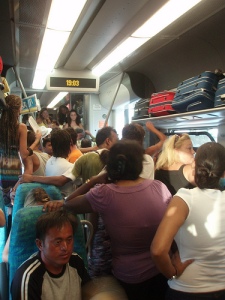
Protest Damage
Since finding myself in the middle of the first violent outburst of students protesters against increased tuition fees, similar outcomes have resulted from further demonstrations and I fear it’s dampening their pledge.
I’m all for student rights, but the extent to which these protesters have gone to, to influence the government, seems a little damaging.
From one extreme to another
You may remember my oersonal account from the first demonstration “A birthday to remember…”. What started out as a peaceful protest, in which Aaron Porter, NUS President, told Passing Comment journalists that he was confident that violence would not take place, resulted in chaos as a number of students broke into Tory HQ at Millbank Tower.
Daisy Bambridge 2010
I got the impression that some protesters I spoke to didn’t understand the proposals, while those breaking into Milbank Tower were 6th form students who didn’t even know what the NUS was.
Government proposals
A common misconstrued argument against fees is that they disadvantage poorer pupils. In fact, those from poorer backgrounds are better off paying less than they currently do, while it’s those from wealthier backgrounds who have to pay more, according to the BBC.
Ed Milliband commented, in the Evening Standard, that fee increase is to accommodate education cuts outlined in October’s budget.
The BBC says that the government admits this but in the Evening Standard, David Cameron says the plans are “fair” (click here to read his comments).
On BBC Q and A of University funding, Education Minister David Willetts says that institutions can only charge £9,000 under exceptional circumstances (e.g. high teaching costs). If universities charge more than £6,000 they must offer scholarships, bursaries, summer schools and outreach programs to encourage poorer people.
In addition:
Convincing Pledge?
Previously, I too was against fee increase but three weeks of protests: a number of arrests; and injuries from violence; I can’t help admit I have lost sympathy.
When discussing tube strikes, MP Caroline Pigeon told Passing Comment’s Lucy Laycock, that one or two strikes are ok: more and we lose interest. I think that this becoming the case among student protests.
I realise that by writing this I’m probably making a few of you scream with dismay but in all honestly, this “revolution” isn’t helping the cause, but damaging the fight.
Revolution: Protesters at Millbank, 10.11.10 demo (Courtesy of Lucy Laycock, 2010)
I should mention that the media has magnified the problem. When covering fee proposals they focus on extremes. Few have pointed that it is unlikely many universities will charge £9,000. During protests, the BBC in particular, chose shots that imply more people than there really are; focusing on the few causing damage, in comparison to the many peaceful students attending the 10.11.10 demonstration.
Nevertheless, damage is still being caused: it could be those few people who ruin the appeal for the entire student population against fee increase. Mr. Clegg, Cameron, and Milliband, have shown apathy in the routes students are taken to be heard.
I cannot predict what the outcome of the vote on tuition fees, but I can be sure that students are doing themselves no good by crying out in such destructive ways.